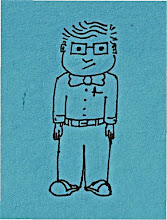Friday, March 11, 2011
All is True? For real?
Saturday, January 22, 2011
Misfortune is Fortune (at least in Television and The Tempest)
There’s a story about an Indian man who finds a very nice wild horse. “That’s lucky,” everyone says.
“Maybe,” the man says.
He gives the horse to his son, who gets thrown off while riding it and breaks his arm. “That’s unlucky,” everyone says.
“Maybe,” the man says.
They send a war party against another tribe, but the man’s son, whose arm is broken, has to stay behind. Many young men were killed. "That's lucky."
"Maybe."
That’s a lovely piece of folk wisdom I learned from Northern Exposure.
Early in The Tempest, Prospero discloses to his daughter the truth about their situation, that he was the deposed Duke of Milan, her response is:
O the heavens!
What foul play had we, that we came from thence?
Or blessed was’t we did?(1:2:59)
Miranda knows immediately that all events have the potential to prove foul or blessed, depending on how long you give them to play out. Prospero’s betrayal and banishment aren’t finished running their course until the end of this play. He manufactures a storm to revenge himself on his brother, who overthrew him, and the other lords who had a hand in his banishment. But by the end of the play, his intentions change. Ariel instructs him in forgiveness:
Ariel:
His tears run down his beard, like winter’s drops
From eaves of reeds. Your charm so strongly works ‘em,
That if you now beheld them, your affections
Would become tender.
Prospero:
Dost thou think so, spirit?
Ariel:
Mine would, sir, were I human. (5:1:16)
In a quest for vengeance, Prospero finds forgiveness. Much like the episode of 21 Jumpstreet where Penhall tells the story about how when he was a kid he got picked on by some douchebag bully. The guy ate his lunch, smashed his toothpick rocketship science project, and crashed his uncle's car with his prom date still in it. All the other cops tell stories about the bullies that picked on them when they were kids too, Johnny Depp has an especially touching story about getting beat up every day in 4th grade by a girl played by the Thor-obsessed little sister in Adventures in Babysitting. But Penhall doesn’t feel better until he goes and confronts his old bully at his house as an adult, only to find that he’s a cigarette smoking, little loser who shouts at his miserable wife and clearly has no joy in his life at all.
The rarer action is
In virtue than in vengeance. (5:1:27)
I might be pulling out some old Catholic School brainwashing here, but the lesson seems to be that forgiveness is vengeance. Despite being opposites, they accomplish the same thing: closure from one series of events and progress into another.
Forgiveness is vengeance. Fortune is Misfortune. Fair is Foul, familiar themes here.
In the very first episode of My So Called Life, Angela Chase and her friend, Rayanne, meet these two guys outside a bar. One of them grabs Rayanne and starts kissing her. Angela narrates: “something was actually happening, but it was a little too actual.” And she steps in to prevent a rape or abduction, the cops come, and it’s this whole little thing. But the next day, they go to school and laugh and laugh about how great it was. Granted they’re ridiculous teenagers, but you can relate. As the people say: someday we’ll look back on all of this and laugh…
There’s a horrible habit that writers have of telling each other that any thing interesting that happens in their life is “good material.” Every time I tell a writer about something, like the time that I got hit by a car, they say, man, that’s great material and I want to tell them to shut up. It’s not material. It’s my life.
Here’s a naïve thought: the power of writing is in universal truth, and its benefit to the world of readers. Your gut-wrenching break up is useless to the majority of humanity, unless you can find the universal truth in the story. When you know things like Shakespeare knew things, about the human condition and the way emotion works, and you lay those ideas into stories, then they resonate. Strike like lightning and thunder forth many Mississippi’s into the future.
I suppose I’m surprised when people think that getting hit by a car is great material, because you can get hit by a car at any moment. People get hit by cars everyday, right?
But if you knew who I was rushing to see when I got hit, or what happened between us in the next few weeks after the accident, then the story might get interesting. If I told you about pulling the quarter-inch shard of windshield out of my thumb the next morning, you might understand the way an event like that, unfortunate as it is, leaves glorious scars.
What I remember most was lying on the ground, having been thrown fifteen feet through the air, my helmet smashed to pieces, the driver of the car – an EMT – cradled my head and neck, and I thought I might never walk again. Never play soccer. Never ride a bike. And I felt just fine. Like I was going to be a new me, and that new me was someone I was looking forward to meeting. Because if you’re a new you, then it’s a new world… well, new to thee.
So is it possible to think of that misfortune -- of getting hit by the car -- as a fortunate event? I’m not foolish enough to label it one way or the other.
But I guess it did turn out to be decent material. For the moment anyway.
